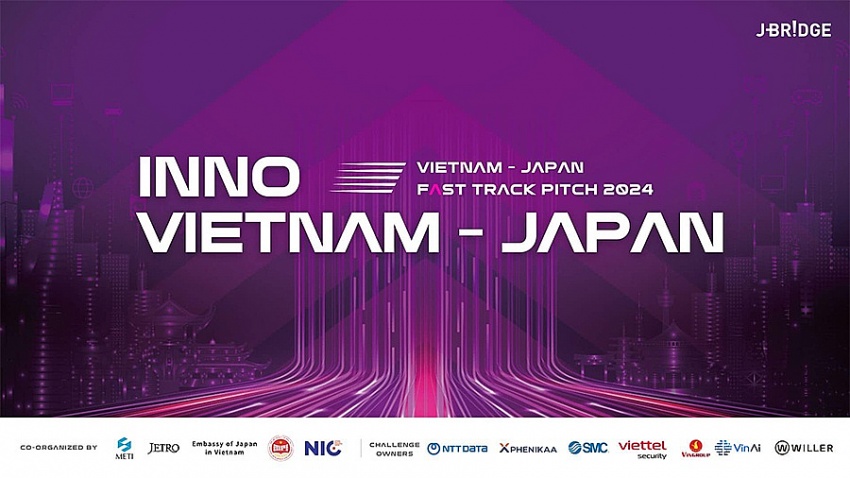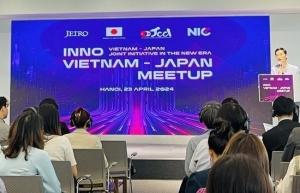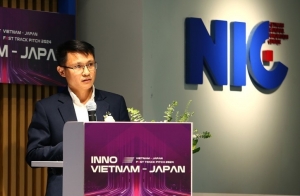Japan’s deep-tech startups to make waves in Vietnam
At the end of July, six selected Vietnamese deep-tech startups gathered at the fourth Inno Vietnam-Japan Meetup, co-organised by the Japan External Trade Organisation’s Ho Chi Minh office. They pitched ideas while seeking funding as well as business collaboration opportunities with Japanese companies.
 |
Among them was Realtime Robotics, a company specialising in drones and related solutions.
“The landscape for deep-tech startups in Vietnam is marked by a scarcity of such ventures, and consequently, very few success stories. Realtime Robotics is perhaps the only deep-tech startup in Vietnam with inventions, patents, and manufacturing know-how to produce patented products like drones and export them to the United States at a premium price,” said the company’s founder Luong Viet Quoc.
Realtime Robotics is maintaining a belief in the capabilities of Vietnamese engineers to create breakthrough inventions in deep tech, particularly within the drone industry. The startup has also embraced crowdfunding to counter the lack of investment institutions.
“Our plan is to provide investors with an opportunity to achieve global success with two of the best patented drone products in the world: the Hera drone and the OmniSight gimbal. These products together have the potential to more than double data-capturing productivity in the global drone industry,” Quoc said, adding that Realtime Robotics is seeking a partner who can offer not only financial support but also access to international drone markets, including Japan.
Another deep-tech startup, Vulcan Augmetics, is developing affordable and advanced robotic prosthetics and sensors for emerging markets. Vulcan Augmetics has raised around $1 million over the last four years, and is currently seeking Series A funding to support international expansion. The startup is already active and selling in Vietnam and aims to expand into other markets such as India, Malaysia, Egypt, and Ukraine.
Vulcan Augmetics co-founder and CEO Rafael Masters said, “The greatest advantage in Vietnam is access to technical expertise combined with affordable labour costs. We have been able to design, develop, license, and bring to market a complex medical device and biometric control software for under $1 million. This would cost at least 10 times more in the west or even Singapore,” he said.
He noted that the Vietnamese population was highly connected, with some of the highest smartphone penetration rates globally, and is receptive to new ideas and technologies. Furthermore, Vietnam’s proactive efforts in establishing relations and free trade agreements with global markets make it an ideal location for manufacturing and exporting hardware.
“Vulcan Augmetics already has some Japanese corporate investors, and is particularly interested in finding Japanese strategic partners to develop teleoperated robotics and remote biometric monitoring technology for applications in elderly care and manufacturing,” he added.
According to Do Ventures, Japan’s potential in deep tech is driven by a combination of advanced technological capabilities, a robust industrial base, a strong research and development (R&D) ecosystem, and proactive government policies. Japan’s significant investment in R&D across universities, research institutes, and corporate labs fosters innovation in areas such as robotics, AI, nanotechnology, and materials science.
Japan’s global leadership in robotics and AI, exemplified by companies like Softbank Robotics and Fanuc, drives innovation in deep tech applications, enhancing automation, efficiency, and capabilities across industries.
Japan-based Reazon Holdings is actively investing in the deep-tech sector, and has already invested in a Vietnamese deep-tech startup.
Satoshi Kuriga, head of Global Investments at Reazon Holdings, said having cutting-edge technology by global standards is the most straightforward path to success. “However, succeeding by this approach alone is quite challenging for Vietnamese deep-tech startups. They would need to compete directly with players from the US and China, who have significant advantages.”
Kuriga explained that when considering Vietnamese deep-tech startups, Reazon focuses on additional aspects beyond tech superiority. These include whether they are addressing problems not present in advanced countries, whether they are developing tech difficult to implement in advanced countries due to environmental factors, and whether they can establish a long-term advantage.
To foster development of Vietnam’s deep-tech startups, Kuriga said, “Grants for deep-tech startups are crucial. They require long-term funding, yet there are few long-term investors in Vietnam. If the government wishes to support Vietnamese deep-tech startups, it should consider providing long-term grants.”
 | Japanese see potential with startup initiatives Amid slow capital flow into frontier financial markets, Japanese funding continues to flow into local startups to strengthen market footprint. |
 | Vietnam and Japan startups collaborate to tackle common challenges Considered the second most promising investment market after the United States, Vietnam is continuing to attract Japanese companies wishing to foster development. |
 | NIC to venture into startup investments The Ministry of Planning and Investment (MPI) on July 24 has proposed the establishment of a National Innovation Support and Investment Fund to manage and utilise its capital based on market principles, accepting potential risks and ensuring transparency. |
What the stars mean:
★ Poor ★ ★ Promising ★★★ Good ★★★★ Very good ★★★★★ Exceptional
Related Contents
Latest News
More News
- SK Innovation-led consortium wins $2.3 billion LNG project in Nghe An (February 25, 2026 | 07:56)
- THACO opens $70 million manufacturing complex in Danang (February 25, 2026 | 07:54)
- Phu Quoc International Airport expansion approved to meet rising demand (February 24, 2026 | 10:00)
- Bac Giang International Logistics Centre faces land clearance barrier (February 24, 2026 | 08:00)
- Bright prospects abound in European investment (February 19, 2026 | 20:27)
- Internal strengths attest to commitment to progress (February 19, 2026 | 20:13)
- Vietnam, New Zealand seek level-up in ties (February 19, 2026 | 18:06)
- Untapped potential in relations with Indonesia (February 19, 2026 | 17:56)
- German strengths match Vietnamese aspirations (February 19, 2026 | 17:40)
- Kim Long Motor and AOJ Suzhou enter strategic partnership (February 16, 2026 | 13:27)

 Tag:
Tag:




















 Mobile Version
Mobile Version